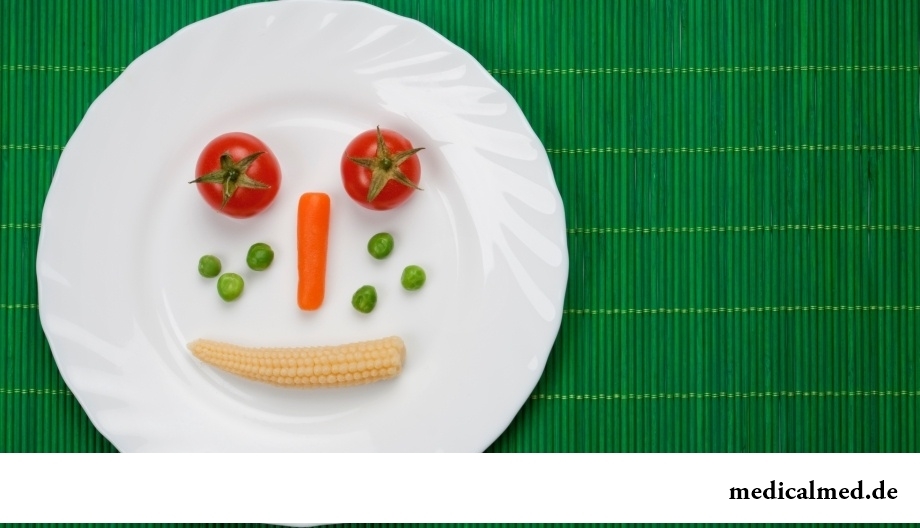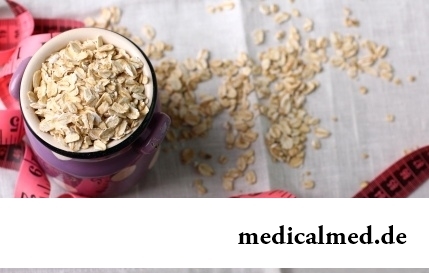





Fasting days: harm or advantage
About influence of fasting days on an organism it is told much – both about advantages, and about shortcomings. It is considered that fasting day in the form of a short-term monodiet is useful, promoting effective removal of slags from an organism whereas irregular, excessively long, spontaneous fasting days lead only to deterioration in health. How to derive benefit from the sparing diet and not to do much harm to itself? Let's consider the main advantages and shortcomings of fasting days and their influence on an organism.

Advantage of fasting days
Fasting day represents a diet when a current of day only one-two products compatible among themselves are eaten. So, kefiric, cottage cheese, cucumber, carrot, apple fasting days or combined are most popular (kefir and apples, kefir and buckwheat, etc.). For muting of feeling of hunger meals divide into 5-6 equal parts that allows food to be acquired better. As a rule, the total caloric content of such diet does not exceed 1000 calories; at the same time nutritionists do not recommend to eat over 700 g of proteinaceous food and 2 kg of vegetables or fruit a day.
Regular (at least 1 time a week) fasting days have three advantages:
- The short-term stress for an organism promoting reorganization of a metabolism and normalization of metabolism. For maintenance of effect of a shake-up it is recommended to arrange unloading in various days of the week that the organism did not adapt to such periods and did not lay fat in store;
- Clarification of an organism. During a similar monodiet also the alimentary system has a rest that is prevention of diseases of digestive tract, allergic diseases, skin diseases, etc. It is considered that short-term restriction in food saves an organism from end products of a metabolism whereas observance of a rigid diet and more, on the contrary, provokes three days their emergence in the form of salts of uric acid and other slags;
- Adaptation to transition to healthy nutrition. Several fasting days in a month will become a fine way of preparation of an organism for increase in a share of healthy food in a diet and will allow to avoid allergic reactions and problems with intestines.
Many women, introducing restrictions in a diet, pursue only one aim – weight loss. In spite of the fact that fasting days are transferred more simply, than diets, they do not lead to permanent decrease in fatty deposits – it is possible to call them means for maintenance of weight at the normal level rather.
Harm of fasting days
Arranging fasting days, it is important to have an idea not only of advantages, but also of shortcomings of a similar diet that on ignorance not to do much harm to the organism. Most often carry to them:
- Inadequate diet. The use of one product leads over 2-3 days to a lack of fats, proteins or carbohydrates that involves failure in a metabolism. It can lead to a vitamin deficiency, anemia, diseases of the alimentary system therefore it is not necessary to increase the number of the fasting days going in a row, arranging, for example, unloading weeks. And practicing fasting days regularly, it is worth alternating diets on structure of products;
- Aggravation of some chronic diseases. In the presence of diseases of digestive tract, liver, kidneys, a diabetes mellitus fasting days can provoke their aggravation. Along with that, at some states the similar method is shown: so, at gout and arthroses it is good to spend cucumber days, at heart diseases – potato, etc. Anyway need of fasting day should be discussed with the doctor.
Also it is worth remembering that excessive hobby for fasting days (is more often 2 weekly) can lead to dystrophy of muscular tissue.
Similar techniques are strictly contraindicated to the children, pregnant women, persons having chronic digestive tract diseases and also the people testing fatigue and an indisposition.
Examples of fasting days
Among others fasting days are most popular proteinaceous (cottage cheese, fish, meat) and carbohydrate (fruit, vegetable). Proteinaceous, well satisfying appetite, are observed easier and are recommended to people who hardly transfer feeling of hunger. Carbohydrate it is more difficult to observe, however they are most useful and allow to liquidate hypostases, to clear intestines, and also to enrich an organism with useful substances.
Carbohydrate fasting days:
- Cucumber (218 kcal) – 1,5 kg of fresh cucumbers in 6-7 receptions without salt. For the night – a glass of 1% kefir;
- Apple (670 kcal) – 1,5 kg of apples, fresh or baked with raisin, in 5-6 receptions. For the night - a glass of 1% kefir;
- Vegetable (535 kcal) – 170 g of carrot and apple salad, 200 g of stewed cabbage, 100 g of green peas, 150 g of beet salad with prunes, dogrose broth;
- Buckwheat – 400 g of boiled buckwheat without salt with mushrooms in 4-5 receptions. For the night - a glass of 1% kefir.
Proteinaceous fasting days:
- Kefiric and cottage cheese (780 kcal) – 400 g of cottage cheese, 1 l of kefir, 2 jars of natural yogurt on 5-6 receptions;
- Chicken with vegetables (850 kcal) – 400 g of boiled chicken breast, 800 g of any fresh vegetables. For the night – a glass of 1% kefir;
- Fish with vegetables – 500 g of boiled fish, 800 g of any fresh vegetables. For the night – a glass of 1% kefir.
In fasting day use as much as possible pure drinking water – not less than 2 liters.
Except proteinaceous and carbohydrate, also fatty fasting days when are eaten only milk, sour cream or cream are applied. According to nutritionists, this option of a diet well sates and prevents transition of carbohydrates to fats, however it is contraindicated to the people having atherosclerosis of vessels, diseases of a liver and biliary tract.

Councils of the nutritionist
That harm of fasting days did not exceed their advantage, it is necessary to introduce restrictions in a diet carefully, following several important rules:
- Do not gorge on for the future evening of day before unloading, after it. The organism demands gradual adaptation to change of a diet therefore it is more preferable to leave a usual diet and to be returned to it carefully, some time observing restrictions in food;
- Exclude the intensive exercise and intellectual stresses demanding big expenses of energy these days. Otherwise strict fasting days can turn back disturbance of functions of an organism, in particular, of a nervous system;
- In fasting day use as much as possible pure drinking water – not less than 2 liters.
It is good to combine the days which are followed by unloading with other ways of clarification of an organism: massage, lymphatic drainage, visit of a sauna or bath. As well as any restriction of food, fasting days can be followed by stagnation of bile therefore during their observance it is recommended to drink a small amount of cholagogue tea before food.
Human bones are stronger than concrete four times.

Dark circles (bruises) under eyes – a shortcoming with most of which often fight against the help of cosmetics (proofreaders, salons...
Section: Articles about health
Women quite often suffer from complexes concerning the sizes of the bust. Strangely enough, not too modest, and excessively curvy shapes become the reason of sincere discomfort sometimes. Except psychological problems, a big bust sometimes with...
Section: Articles about health
Coffee – favourite drink of many. For the last decades it more than once already declared very harmful, extremely useful and even necessary for normal life activity. In spite of the fact that this product became for us usual for a long time, there are many myths about properties of coffee and its impact on a human body. Readers can get acquainted with the most widespread of similar delusions today....
Section: Articles about health
The problem of diagnosis was and remains to one of the most important in medicine. From that, the reason недо will be how precisely defined...
Section: Articles about health
In consciousness of our many compatriots idea that folk remedies if are no more effective, than medicinal "chemistry" strongly took roots, then are precisely less harmful. Unfortunately, it is not always fair: some receptions treating...
Section: Articles about health
Transfusion of donor blood has almost century history. In spite of the fact that this procedure is quite usual for many people, process of blood donation is still surrounded with numerous myths. Today we aimed to discredit the most widespread of them....
Section: Articles about health
The words "disease" and "patient" not without reason come from one root – "pain". As a rule, symptoms of illnesses thoroughly spoil the patient...
Section: Articles about health
It is pleasant to state a possibility of improvement of quality of life of people with problems of functioning of secretory system. Efforts of talented inventors created products which will be able to provide normal life activity of clients with moderate degree for...
Section: Articles about health
The list of stereotypes of which, apparently, all know strongly includes following: British surely eat porridge for breakfast. Perhaps, not all modern residents of Britain arrive quite so, but for those from them which continue to follow this tradition, it is possible to be glad sincerely: oat flakes are a product which regular use not only helps the person to keep force and beauty long. Porridge in a special way influences an organism, protecting it from seriousness...
Section: Articles about health
The stroke is one of the most widespread diseases of the person, annually in the world about 6 million cases эт are registered...
Section: Articles about health
Osteoporosis this general disease which main sign is decrease in density of a bone tissue. On distribution width it takes the fourth place among noninfectious diseases. The illness develops at mature age more often: in our country to them harvest seasons...
Section: Articles about health
It would seem, to buy drugs in Moscow does not make a problem – a drugstore, and not one, is available for each resident of the capital within walking distance. And, nevertheless, Internet drugstores become more popular – what it is possible to explain such phenomenon with? Actually there is a lot of reasons and if to formulate them it is short, then the most suitable word will be - "conveniently". We suggest to get acquainted in more detail with pluses and minuses of online drugstores that buying drugs, not to make the wrong choice....
Section: Articles about health
Wood louse – the ordinary-looking unpretentious plant extended in all territory of our country. It quickly expands, and sometimes for...
Section: Articles about health
Practically each person is familiar with the annoying, pulling, unscrewing pains caused by overcooling of muscles of a back. In certain cases inflammatory process is not limited to discomfort, being followed by emergence of hypostasis, consolidations, increase температ...
Section: Articles about health
The body of the person almost for 60% consists of water. It is so important for normal functioning of an organism that loss of only one and a half percent of liquid already leads to the most unpleasant effects. The problems connected with deficit of water can overtake also the healthiest person if he, for example, spends several hours under the scorching sun, without having taken with themselves drink, but is very simple to correct health in this case. It is much more difficult to minimize effects of other reasons about...
Section: Articles about health
Venereal diseases in medicine are called the infections which are transmitted preferential sexually, now they are so...
Section: Articles about health
Dietary supplements (dietary supplements) for the last decades were so thoroughly included into our life that, apparently, it is already impossible to find the person who at least once did not try them. At the same time, most of our compatriots have a vague idea about...
Section: Articles about health
Bathing in broths of medical flowers and plants (phytobathtub) was eurysynusic since Cleopatra who is a good judge in all that concerns beauty and health. And today phytobathtubs is the simple and available means allowing not only to remove nervous tension, but also to recover from many diseases. Grass bathtubs at treatment of cold, osteochondrosis, radiculitis, skin diseases, and also diseases of urinary tract and vessels are especially effective....
Section: Articles about health
White teeth and the Hollywood smile – a dream of many people. Long time was considered that a plaque on teeth and change of their color – destiny of those...
Section: Articles about health
The way of life of people promptly changes from year to year: if about ten years ago the personal computer was not in each family, then today already very few people do without this device. Certainly, and children master the computer at full speed: they not only I play...
Section: Articles about health
From the failure of work of immune system which is shown in the form of an allergy, statistically, more than 40% of the population of the globe suffer. In most cases pathological reactions cause the substances which are contained in food stuffs, hair of animals, medicines, goods of household chemicals, cosmetics, pollen of plants, etc. On the one hand, the disease such is capable to spoil quite thoroughly to the person life....
Section: Articles about health
For the person who daily since morning gathers for work it is very important to wake up vigorous and ready by day of work. On most...
Section: Articles about health
It is known that the person for 80% consists of water which participates in all processes of an organism. The person loses liquid daily – as a result of sweating, breath, an urination, and its insufficient completion due to various reasons can bring to обезвожив...
Section: Articles about health
Life activity of one-celled fungi of the sort Candida, related to yeast is a proximate cause of development of candidiasis (milkwoman). Normal these microorganisms are a part of the microflora living in an oral cavity and intestines of most of people and also in a female genital tract. The pathological phenomena are observed when fungi begin to breed too violently. At the same time there is an inflammatory process affecting mucous membranes and which is shown very nepr...
Section: Articles about health
The medicine promptly develops, and the fact that else quite recently it seemed by miracle can now. We are not surprised any more to the fact that sport...
Section: Articles about health
The name of this disease precisely reflects the problem reason: it consists in the bra fastener pressure upon a certain zone of a back. At the same time one of vertebrae of chest department of a backbone is as if blocked and loses mobility, and falling on it is nude...
Section: Articles about health
Subfebrile temperature call fervescence to 38 degrees, and subfebrile condition - existence of such temperature over 3 days, and quite often it happens without the visible reasons. Existence of subfebrile condition - a strong indication of disturbances in an organism which can be caused by various reasons: disease, stresses, hormonal failures. Despite the seeming inoffensiveness it is a state at which people often continue to lead a usual life, often is a sign of many of a zabolev...
Section: Articles about health
